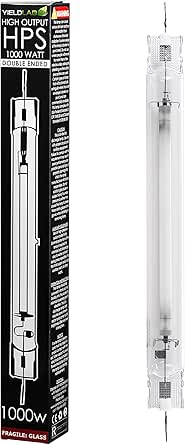The Yield Lab Double Ended 1000W Grow Light Bulb is a powerful and efficient lighting solution designed for hydroponic, aeroponic, and horticulture growing. This high-pressure sodium (HPS) bulb boasts several features that make it a popular choice among growers. However, like any product, it also has some potential drawbacks. Let’s explore the pros and cons of this grow light bulb to help you decide if it’s the right fit for your needs.

Pros
Brighter and more efficient than standard HPS bulbs: The double-ended design of this bulb allows it to deliver an intense orange spectrum that other lights cannot match.
Even light coverage: These DE bulbs are powered from both ends, resulting in even firing and operation, which leads to even light coverage, a stronger output, and longer lifespan.
Increased growth and yield: The higher caliber of this bulb with a higher and stronger spectrum output will increase your vegging growth and overall flower density and yield.
Compatible with high-frequency electronic ballasts and double-ended grow light reflectors: This bulb is designed to be used with the necessary equipment for optimal performance.
Long lifespan: The Yield Lab Double Ended 1000W Grow Light Bulb has an expected lifespan of 24,000 hours.
Cons
High initial cost: While the bulb may pay for itself in the long run due to its efficiency and performance, the initial investment is relatively high compared to some other grow light options.
Requires specific equipment: To use this bulb effectively, you need to have a compatible high-frequency electronic ballast and double-ended grow light reflector with K12x30S lamp sockets. This additional equipment adds to the overall cost of setting up your grow operation.
Generates heat: Like most high-intensity discharge (HID) grow lights, the Yield Lab Double Ended 1000W Grow Light Bulb generates a significant amount of heat. This may require additional cooling measures in your grow space to maintain optimal temperatures for your plants.